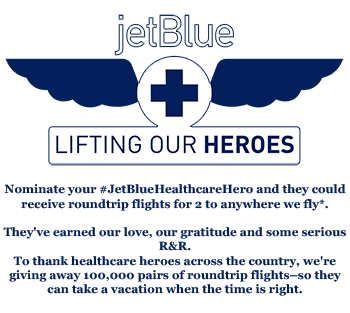JetBlue Healthcare Heroes Sweepstakes (100,000 Pairs of Roundtrip Flights)
Posted On May 13, 2020

A total of 100,000 pairs of roundtrip flights will be awarded: 90,000 selected via a random drawing among all eligible entries received; 10,000 donated to healthcare workers across public & private hospitals in our hometown of NYC.
Nominate your #JetBlueHealthcareHero and they could receive roundtrip flights for 2 to anywhere we fly
Entrants may not nominate themselves. Entrants may nominate as many individuals as they wish; however, each nomination must be submitted separately and an Entrant may only nominate the same individual one time. Multiple entries received from the same Entrant for the same Nominee will be void. Entries must be complete to be eligible,
Eligible Healthcare workers, Public Health workers, and First Responders are defined here as those who are actively serving outside of their homes on the frontlines of the of the Covid-19 response in the following roles:
a. Workers who perform critical clinical research, development, and testing needed for COVID-19 response.
b. Healthcare providers and Caregivers including physicians, dentists, psychologists, mid-level practitioners, nurses and assistants, infection control and quality assurance personnel, pharmacists, physical and occupational therapists and assistants, social workers, optometrists, speech pathologists, chiropractors, and diagnostic and therapeutic technicians and technologists.
c. Hospital and laboratory personnel (including accounting, administrative, admitting and discharge, engineering, epidemiological, source plasma and blood donation, food service, housekeeping, medical records, information technology and operational technology, nutritionists, sanitarians, respiratory therapists, etc.).
d. Workers in other medical and biomedical facilities (including Ambulatory Health and Surgical, Blood Banks, Clinics, Community Mental Health, Comprehensive Outpatient rehabilitation, End Stage Renal Disease, Health Departments, Home Health care, Hospices, Hospitals, Long Term Care, Nursing Care Facilities, Organ Pharmacies, Procurement Organizations, Psychiatric Residential, Rural Health Clinics and Federally Qualified Health Centers, and retail facilities specializing in medical good and supplies).
e. Manufacturer workers for health manufacturing (including biotechnology companies), materials and parts suppliers, logistics and warehouse operators, distributors of medical equipment (including those who test and repair), personal protective equipment (PPE), isolation barriers, medical gases, pharmaceuticals (including materials used in radioactive drugs), dietary supplements, blood and blood products, vaccines, testing materials, laboratory supplies, cleaning, sanitizing, disinfecting or sterilization supplies, and tissue and paper towel products.
f. Public health / community health workers, including those who compile, model, analyze and communicate public health information.
g. Blood and plasma donors and the employees of the organizations that operate and manage related activities.
h. Workers who manage health plans, billing, and health information, who cannot practically work remotely.
i. Workers who conduct community-based public health functions, conducting epidemiologic surveillance, compiling, analyzing and communicating public health information, who cannot practically work remotely.
j. Workers performing information technology and cybersecurity functions at healthcare and public health facilities, who cannot practically work remotely.
k. Workers performing security, incident management, and emergency operations functions at or on behalf of healthcare entities including healthcare coalitions, who cannot practically work remotely.
l. Pharmacy employees necessary to maintain uninterrupted prescription filling.
m. Workers performing mortuary funeral, cremation, burial, cemetery, and related services, including funeral homes, crematoriums, cemetery workers, and coffin makers.
n. Workers who coordinate with other organizations to ensure the proper recovery, handling, identification, transportation, tracking, storage, and disposal of human remains and personal effects; certify cause of death; and facilitate access to mental/behavioral health services to the family members, responders, and survivors of an incident.
o. Police officers, paramedics, EMTs, firefighters, and those who are immediately responding to the scene of emergencies and accidents to provide assistance in an official capacity on the frontlines of Covid-19.